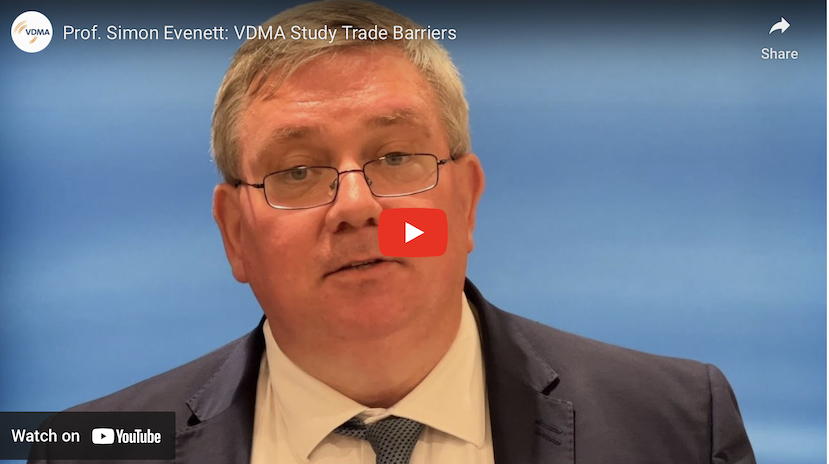Protectionism rising worldwide, harming global trade

- Protectionism hinders 80 percent of all European machinery exports
- State-led export promotion for non-European competitors also creates significant disadvantages
- Free trade agreement with Mercosur and India urgently needed
Brussels, 22/06/2022 – Free trade is increasingly hampered by government protectionist measures around the world, and there is no relief in sight. On the contrary, in recent years the disputes between China and the United States, the Covid-19 pandemic, and state-led industrial policies are leading to new and deeper trade barriers worldwide. This augurs badly for Europe’s export-dependent mechanical and plant engineering industry: as of the beginning of 2022, some 80 percent of all its exports face tariff barriers, or foreign competition aided by subsidies and or government export promotion measures. This is the central finding of the new study “Foreign Protectionism Affecting EU Mechanical Engineering Exports”, prepared by the Global Trade Alert Team of the University of St. Gallen on behalf of the VDMA.
The new Europe-wide study complements a previous 2020 study focused only on German machinery exports. “The picture is frightening for our entire European industry. The gradual return of protectionism and trade barriers is costing jobs and eroding prosperity. The European mechanical engineering sector depends on stable and predictable framework conditions for exports and investments. That is why the EU must double down on concluding new free trade agreements, for example with the Mercosur states and India,” Ulrich Ackermann, Head of VDMA Foreign Trade, stated during the presentation of the new study in Brussels.
Disadvantages in international competition
According to the study, by far the most pervasive trade barrier in the machinery and plant manufacturing sector (impacting almost 3 out of 4 companies) is government export promotion measures. In addition, many competitors outside Europe receive direct subsidies from their home governments. Both hinder European suppliers in their local markets and lead to noticeable competitive disadvantages for European machinery manufacturers on export markets. “At the beginning of this year, about half of all European machinery exports to China, India and the United States were affected by subsidy hurdles, which manifest themselves – for example, in the United States – in the form of direct subsidy measures and state tax rebates,” VDMA department head Ackermann explained. The governments of China, Brazil, India and also the United Kingdom undermine free trade by subsidizing their own exporters – this impacts around 50 percent of all European mechanical engineering exports.
The EU must do all it can to promote further free trade agreements, for example with the Mercosur states or India.
Ulrich Ackermann, Head of VDMA Foreign Trade Department
Customs hurdles significant in only a few countries
Traditional customs duties, on the other hand, do not currently play a significant role in mechanical and plant engineering. As the study shows, these trade barriers have even been partially dismantled, for example for exports to Brazil or China. But in Brazil in particular, customs barriers are still high at around 10 percent. And India’s tariffs on mechanical engineering products reach an average of 7.5 percent. So-called technical barriers to trade are significant in many countries. Technical requirements in the United States, China, Canada, and Brazil are particularly and unnecessarily costly.
The EU is also walling itself off
The EU is also no role model when it comes to trade barriers. Admittedly, customs duties de facto no longer play a role on the European continent; the market is open to all competitors from outside at this point. “But especially vis-à-vis Asia, the EU is increasingly walling itself off, with the help of technical trade barriers. The sophisticated technical regulations in the EU act like a trade barrier for machinery exporters from third countries,” declared Ackermann. Moreover, in certain fields of technology, EU-based companies are subsidized or new support measures for EU companies are being discussed.
“In this export-based global economy, increasingly distorted by subsidies, we need a new, single set of universal rules within the framework of the World Trade Organization (WTO). But this is almost unimaginable in the near term under current conditions,” concluded the VDMA foreign trade expert. What is needed, therefore, is for the EU to do more to promote the acceptance of global standards in the form of ISO and IEC. Moreover, together with other states, it should vigorously fight against economic pressure from third countries – for example, China on Lithuania – as provided for in the EU’s so-called anti-coercion instrument, Ackermann demanded.


The VDMA is Europe’s most important mechanical engineering industry associaton and represents more than 3,400 German and European companies. The industry stands for innovation, export orientation and medium-sized businesses. The companies employ around four million people in Europe, more than one million of them in Germany alone. Mechanical and plant engineering represents a European turnover volume of around 800 billion euros. In the entire manufacturing sector, it contributes the highest share to the European gross domestic product with a value added of around 270 billion euros.





